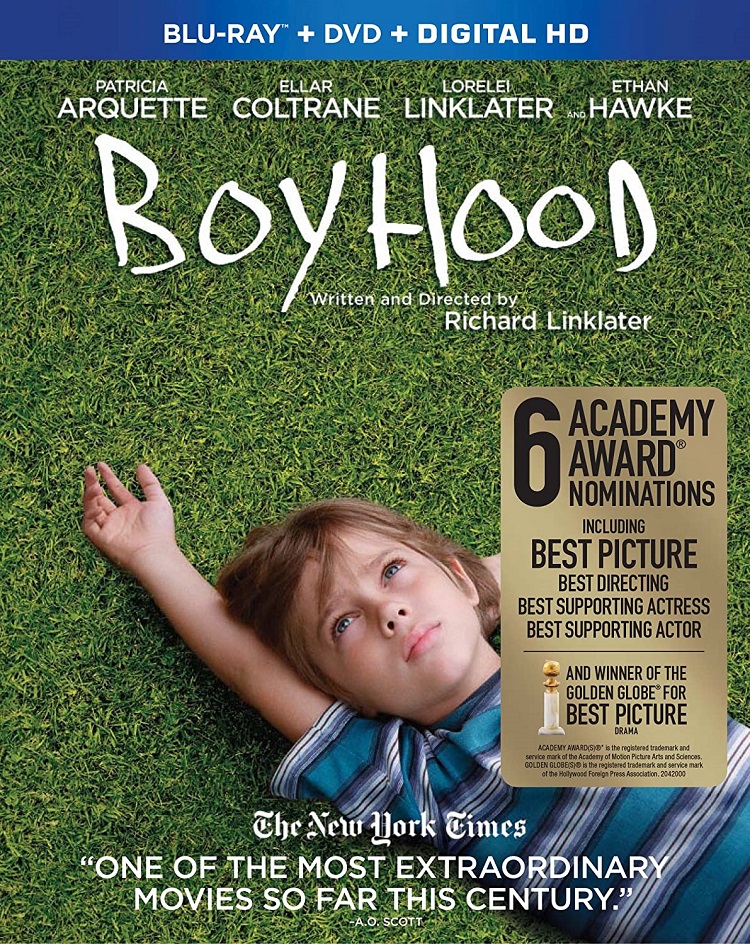
That Boyhood, Richard Linklater’s “epic of minutia,” had an unconventional production schedule is something of an understatement. For an even dozen years, the cast and crew met once a year to chronicle both the aging and maturing (two distinct and separate processes) of Mason (Ellar Coltrane), his sister Samantha (played by the director’s daughter Lorelei Linklater), and their parents Olivia and Mason Sr. (Patricia Arquette and Ethan Hawke). What for some less fearless actors and filmmakers would have been a quixotically crazy commitment has produced a unique film, not without its flaws, that effectively plays with audience expectations about plot, story, and time. Arquette, Hawke, Coltrane and Linklater met the press recently in New York City to discuss Boyhood.
● On the unique once-a-year filmmaking process:
Patricia Arquette: It was jumping into the void from the get-go, but when you’re in the right hands and you jump into the void together, really great things can come of it. Showing up with these people every year, meeting with each other, building on each other – it was collaborative and it built upon itself, and it felt safe with everyone, and I trusted the process.
Richard Linklater: It was special to get together every year. The crew felt it, the cast, we were all committed. It was a life project. It never felt like anyone wavered, [although] I’ve had to drag Ethan into every project we’ve ever done.
Ethan Hawke: I meant never to work with him again, but we only grew to love the project more and more and more.
● On the challenges of getting back into character each year:
Ellar Coltrane: I get asked about this a lot. It was a very long build-up every year, so we had a couple of months to think about what we were doing, a solid week work shopping and figuring out where the characters were that year, so by the time we got to filming, we could just start there.
EH: We had a very good director. I saw the way you had to work with Ellar, which was different from the way you worked with Lorelei, and me, and Patricia. I’ve worked with Rick eight times now and watched him learn how to speak to people the way they need to be spoken to, and that’s what helps you be ready to play. We were always prepared to play.
● On Boyhood‘s lack of big “dramatic” moments:
EC: In most films, I think there’s this tendency or need to gravitate to hyper-drama, as if that’s the only thing that makes a story worth telling – these big fantastical moments that don’t happen to most of us. I think it’s really powerful to kind of dwell on the little things. In terms of my character, there are a lot of small things that you see after 12 years, but day to day you’re just one day older.
EH: It’s interesting to see the power of our pre-conditioned experiences of the cinema, of thinking something big is going to happen. There’s unbelievable tension in the minutiae of the movie; we’re so conditioned to think something horrible must happen. We wouldn’t just be watching people drive to this university if there wasn’t going to be a car wreck.
RL: It’s an epic about minutiae. This movie bet the farm on this little collection of intimate moments that probably don’t fit into most narratives because they’re not advancing the character, or story or plot. I’ve replaced plot with structure, because that’s much more innate to how we think. Humans put a structure on everything, including time, but structure doesn’t have a lie to it whereas plot often does.
● On how the filmmakers’ lives influenced the story:
RL: I always thought we’d see Mason drift into some form of expression, by junior high or high school. I thought it might be with writing, or maybe making music. [Ellar] did become a visual artist and got interested in photography, and I thought “Great, perfect, I was taking pictures at that age.” It was a perfect thing for the character to get into.
EH: The most beautiful experience about being in this movie is about watching Ellar become a creative entity. It’s Ellar’s performance and his creativity and passion that elevates us all and makes it more than just structure. Watching you survive adolescence and that you let the movie be not just Rick’s or my expression, but also yours. That was happening in the movie, and it was happening on set, in different ways. Ellar is not Mason, they’re very different people, but there’s a similar development.
RL: For the adults we had our own childhood experiences to draw on, our relations to our own parents, and ourselves as parents. It was this multigenerational collaboration of all of us. During the filming we [collectively] had five children born, Ellar had a new sister. Life was all around us.
● On the film’s portrayal of parents and children:
RL: The movie was always going to be a portrait of growing up, but also parenting and aging – that you don’t quit growing up, especially when you become a parent, particularly a young parent in [Mason Sr. and Olivia’s] case. They’re still growing up, sort of bumbling through parenting. The scene near the end, where Mason leaves for college and Olivia gets so upset – we all did that. I remember my own inability to totally comprehend my mother’s point of view at that age. You could be the most empathetic person in the world, but as a young person you just don’t have the life experience to fully understand what they are going through. You can acknowledge it, but you can’t fully feel it. We see that contrast; that’s what this film is talking about.